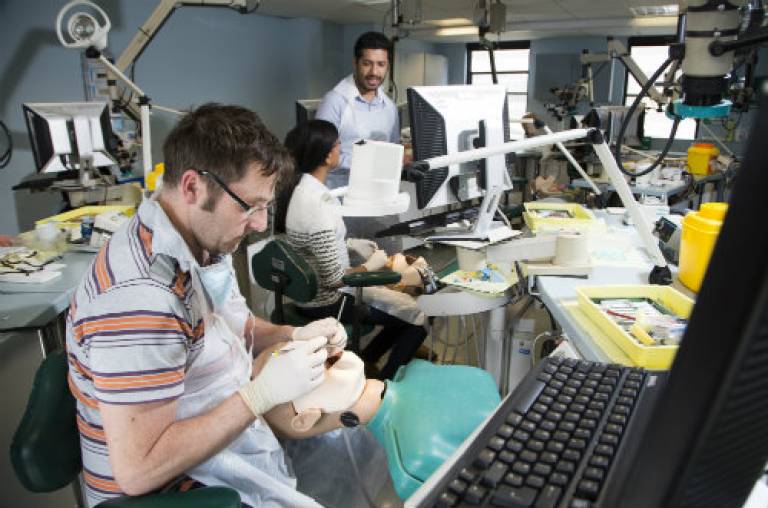How can Postgraduate Teaching Assistants benefit from UCL Arena One?
14 August 2015

Dallas Roulston (Postgraduate Researcher and Teaching Assistant, UCL Eastman Dental Institute) recently submitted a successful application to gain Associate Fellowship through UCL Arena One. He shares his experience of the programme.
2014-15 has been a busy year for UCL Arena with 1433 staff participating in a range of courses and events. Sessions are always evaluated and the results show that participants are gaining a lot from Arena.
Currently in the third year of a PhD at Eastman Dental Institute with a background as a microbiologist, Dallas approached UCL Arena with some prior experience of teaching in a professional context. He says, “I thought that I might want to pursue an academic career after my studies and wanted to develop my teaching capabilities - regardless, it has been extremely useful as the skills I have picked up will be useful as most jobs nowadays require the ability to teach.”
Dallas was recommended UCL Arena by a colleague and the development pathway he has followed through UCL Arena One (for Postgraduate Teaching Assistants only) has provided an opportunity to reflect and evaluate on his UCL teaching experience. Through this he has gained a professional qualification, Associate Fellowship, accredited by the Higher Education Academy.
Throughout his three years at UCL, his teaching responsibilities have increased. During the first year, he contributed to planning undergraduate sessions and by providing lab assistance. The following year, he carried out many of the technical demonstrations which formed part of students’ classes. In the current year, Dallas now leads on the teaching within one of the courses.
UCL Arena has been useful in putting this experience in to context through the many workshops and seminars focussed on developing approaches to teaching. Open to colleagues across the university, UCL Arena 'Essentials' sessions provide a chance to share ideas with staff from all parts of UCL and hear new methods from internal and external speakers. Dallas explains: “Many of the sessions have been inspiring as they often discuss new methods and resources and provide encouragement to give something new a go.”
UCL Arena has assisted with developing techinques to meet teaching challenges. Dallas has picked up ideas on how best to facilitate group teaching and group discussion. Recently, as part of the UCL Arena One series of events, he took a group of students to an object-based learning session, providing an opportunity to interpret and articulate an object unrelated to their area of study. Taking place in the UCL Grant Museum, the task encouraged students to think critically about what they were describing and to try shaping and validating an assertion through dialogue. From this, students have been able to hone key research skills applicable to their own areas of study and benefit from hands-on research-based learning.
“Teaching can be quite formulaic, especially with lectures and seminars, but UCL Arena has enabled me to think about what I get out of teaching and what resources are available,” Dallas comments. “The events and workshops have been useful for getting an idea of what might work in future lessons – what to try out with students and how I might successfully adapt the course material. Receiving an Associate Fellowship has been great recognition of my teaching experience to date and gives me confidence to learn and apply new techniques.”
Using an Arena-developed technique, Dallas’ approach used a ‘plan, try, observe and reflect’ method when supervising a Master’s student in the lab as part of their MSc project. This was a useful way to ensure consistency in the support being given. By making no assumptions, he ensured basic methods were described, discussed and shown so that the student would be able to ask questions and for clarification, therefore opening a channel of continuous feedback through regular dialogue.
“I would recommend UCL Arena to anyone who is interested in developing their teaching. The sessions and workshops proved really useful; not only in discussing and sharing teaching practice but also in building professional and soft skills such as dealing with difficult situations or communicating. In that way, regardless of what your destination might be after completing a PhD, it will prove very helpful.”
More information:
 Close
Close

